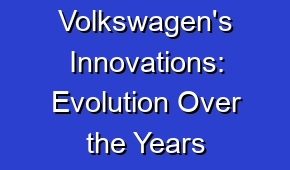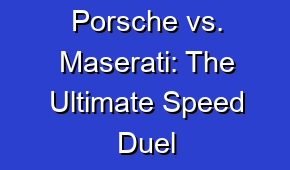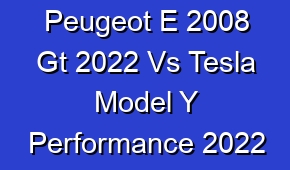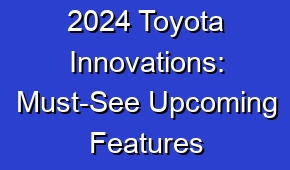Volkswagen’s Innovations: Evolution Over the Years

Discover Volkswagen’s groundbreaking innovations that have shaped the automotive industry over the years. From pioneering safety features to cutting-edge technology, explore how Volkswagen has continuously pushed boundaries to deliver exceptional driving experiences.
Volkswagen has been at the forefront of automotive innovations through years. With a rich history spanning decades, the German automaker has consistently introduced groundbreaking technologies that have revolutionized the industry. From the iconic Beetle to the modern electric ID.3, Volkswagen has continuously pushed the boundaries of design, performance, and sustainability.
One of Volkswagen’s notable innovations was the introduction of the direct-shift gearbox (DSG), a dual-clutch transmission system that provided seamless gear changes and improved fuel efficiency. This breakthrough technology became a game-changer in the automotive world.
In recent years, Volkswagen has also made significant strides in electric mobility. The launch of the ID.3 marked a new era for the company, with its advanced electric drivetrain and cutting-edge features. This electric vehicle represents Volkswagen’s commitment to sustainable transportation and showcases their dedication to innovating for a greener future.
Furthermore, Volkswagen has embraced connectivity with their innovative Car-Net system, which allows drivers to access a range of services and features through their smartphones. This integration of technology and convenience demonstrates Volkswagen’s commitment to enhancing the driving experience.
In conclusion, Volkswagen’s innovations through years have shaped the automotive industry and continue to inspire other manufacturers. With their focus on technological advancements, sustainability, and customer satisfaction, Volkswagen remains a leader in innovation.
| Volkswagen’s innovations through the years: |
| The introduction of the iconic VW Beetle revolutionized the automotive industry. |
| Volkswagen’s development of fuel-efficient engines contributed to environmental sustainability. |
| The implementation of advanced safety features enhanced Volkswagen’s reputation for reliability. |
| Volkswagen’s integration of smart technology improved driving experience and connectivity. |
| The introduction of electric and hybrid vehicles showcased Volkswagen’s commitment to sustainability. |
- Volkswagen’s constant focus on innovation has led to groundbreaking advancements in automotive technology.
- The incorporation of autonomous driving capabilities has made Volkswagen vehicles more convenient and safe.
- Volkswagen’s commitment to emissions reduction has resulted in cleaner and more eco-friendly vehicles.
- The development of infotainment systems has enhanced the overall driving experience for Volkswagen owners.
- Volkswagen’s continuous research and development efforts have led to the creation of futuristic concept cars.
What are the key innovations introduced by Volkswagen over the years?
Volkswagen has been at the forefront of automotive innovation, introducing several key advancements over the years. One of their notable innovations is the development of the direct-shift gearbox (DSG), which combines the efficiency of a manual transmission with the convenience of an automatic transmission. This technology allows for quick and seamless gear changes, enhancing both performance and fuel efficiency.
| Key Innovation | Year | Description |
| Volkswagen Beetle | 1938 | Introduced the iconic “Beetle” model, which became one of the most successful cars in history. |
| Golf GTI | 1976 | Introduced the Golf GTI, the first hot hatchback, which revolutionized the compact car segment. |
| Electric Vehicle Strategy | 2015 | Announced a comprehensive strategy to focus on electric vehicles, aiming to become a leader in sustainable mobility. |
Another significant innovation by Volkswagen is the introduction of electric vehicles (EVs). They have developed various models such as the Volkswagen ID.3 and ID.4, which are fully electric and offer zero-emission driving. These EVs utilize advanced battery technology and regenerative braking systems to maximize range and energy efficiency.
How has Volkswagen improved vehicle safety through its innovations?
Volkswagen has continuously prioritized vehicle safety and implemented various innovations to enhance occupant protection. One of their notable advancements is the introduction of advanced driver-assistance systems (ADAS). These systems utilize sensors, cameras, and radar technology to provide features such as adaptive cruise control, lane-keeping assist, and autonomous emergency braking, helping to prevent accidents and mitigate potential risks.
- Volkswagen introduced the Electronic Stability Control (ESC) system, which helps prevent skidding and loss of control. This system uses sensors to detect the vehicle’s direction and compares it to the driver’s input. If a difference is detected, the system automatically applies brakes to individual wheels to help stabilize the vehicle.
- Another safety innovation by Volkswagen is the Adaptive Cruise Control (ACC) system. This system uses radar technology to maintain a safe distance from the vehicle ahead. It automatically adjusts the vehicle’s speed by braking or accelerating to maintain the desired distance set by the driver, reducing the risk of collisions.
- Volkswagen has also implemented advanced safety features such as Lane Assist and Blind Spot Detection. Lane Assist uses cameras to monitor the vehicle’s position within the lane and alerts the driver if the vehicle starts to drift out of the lane. Blind Spot Detection uses sensors to detect vehicles in the driver’s blind spot and provides visual or audible warnings to avoid potential collisions during lane changes.
In addition, Volkswagen has also incorporated crash-optimized designs in their vehicles, utilizing high-strength materials and structural reinforcements to improve crashworthiness. They have also integrated advanced airbag systems and active safety features to further enhance occupant safety in the event of a collision.
What are Volkswagen’s contributions to environmental sustainability?
Volkswagen has made significant contributions to environmental sustainability through its innovative technologies. One notable example is their development of clean diesel engines, which offer improved fuel efficiency and reduced emissions compared to traditional diesel engines. These engines utilize advanced exhaust after-treatment systems to minimize harmful pollutants.
- Volkswagen has committed to becoming a carbon-neutral company by 2050. This means that they aim to offset all of their carbon emissions and reduce their carbon footprint to zero.
- They have invested heavily in electric vehicle (EV) technology and have launched several electric models, such as the ID.3 and ID.4, to promote sustainable mobility and reduce emissions from transportation.
- Volkswagen has implemented various energy-saving measures in their manufacturing processes. For example, they have optimized their production facilities to reduce energy consumption and have installed energy-efficient equipment and lighting.
- They have also focused on sustainable sourcing of materials for their vehicles. Volkswagen is working to ensure that the raw materials used in their cars, such as lithium for batteries, are responsibly and ethically sourced.
- Volkswagen is actively involved in environmental initiatives and partnerships. They collaborate with organizations like The Climate Group and support projects that aim to promote renewable energy, protect biodiversity, and combat climate change.
Furthermore, Volkswagen has been actively investing in electric mobility and has introduced a range of electric and hybrid vehicles. By promoting the use of electric powertrains, Volkswagen aims to reduce carbon emissions and combat climate change. They have also been investing in renewable energy sources and implementing sustainable manufacturing practices to minimize their environmental impact.
How has Volkswagen revolutionized car connectivity?
Volkswagen has embraced the era of digitalization and connectivity, revolutionizing the way cars interact with their drivers and surroundings. One of their notable innovations is the integration of advanced infotainment systems. These systems provide seamless connectivity with smartphones, allowing users to access navigation, music, and other apps directly from their car’s touchscreen display.
| Enhanced Infotainment System | Smartphone Integration | Connected Car Services |
| Volkswagen has developed advanced infotainment systems that offer seamless connectivity and a wide range of features. | They have integrated smartphone compatibility, allowing users to easily connect their devices and access various apps and functions. | Volkswagen provides connected car services, such as remote vehicle control, real-time traffic updates, and emergency assistance. |
| Their infotainment systems support voice commands, touchscreens, and gesture controls, providing a user-friendly and interactive experience. | Through smartphone integration, users can make hands-free calls, stream music, and use navigation services directly from their devices. | These connected car services enhance convenience, safety, and overall driving experience for Volkswagen owners. |
In addition, Volkswagen has also introduced connected car services that offer features such as remote vehicle control, real-time traffic updates, and emergency assistance. These services utilize telematics technology to enhance convenience, safety, and overall driving experience.
What are Volkswagen’s advancements in autonomous driving?
Volkswagen has been actively developing autonomous driving technologies to pave the way for future mobility. They have introduced various features such as adaptive cruise control, which maintains a safe distance from the vehicle ahead, and lane-keeping assist, which helps keep the vehicle within its lane.
Volkswagen has made significant advancements in autonomous driving technology, focusing on AI, sensors, and advanced driver assistance systems.
Furthermore, Volkswagen has also showcased concept vehicles with advanced autonomous capabilities, such as the Volkswagen ID. Vizzion. These vehicles utilize a combination of sensors, cameras, and artificial intelligence to enable self-driving functionality, offering a glimpse into the future of mobility.
How has Volkswagen improved fuel efficiency in its vehicles?
Volkswagen has been dedicated to improving fuel efficiency in its vehicles through various innovations. One of their significant advancements is the development of efficient turbocharged engines. These engines utilize turbocharging technology to maximize power output while minimizing fuel consumption.
Volkswagen has improved fuel efficiency in its vehicles through advancements in engine technology, aerodynamics, lightweight materials, and hybrid/electric powertrains.
In addition, Volkswagen has also introduced lightweight construction techniques in their vehicles, utilizing materials such as high-strength steel and aluminum to reduce overall weight. This, combined with aerodynamic designs, helps improve fuel efficiency and reduce carbon emissions.
What are Volkswagen’s latest innovations in vehicle design?
Volkswagen has been pushing the boundaries of vehicle design with its latest innovations. One notable example is the introduction of the modular electric drive matrix (MEB) platform. This platform is specifically designed for electric vehicles and allows for flexible vehicle architectures, spacious interiors, and optimized battery placement.
Volkswagen ID.3
The Volkswagen ID.3 is an all-electric compact car that represents a major step towards sustainable mobility. It is built on Volkswagen’s modular electric drive matrix (MEB) platform, which allows for a spacious interior and long-range capabilities. The ID.3 also features a minimalist design with clean lines and a streamlined shape, reducing drag and improving efficiency. With its innovative technology and eco-friendly features, the ID.3 sets a new standard for electric vehicles in terms of design and performance.
Volkswagen Golf 8
The Volkswagen Golf 8 is the latest iteration of the iconic Golf model, showcasing Volkswagen’s commitment to innovation and modern design. The Golf 8 features a sleek and sporty exterior, with dynamic lines and a bold front grille. Inside, it offers a digital cockpit with a high-resolution display and intuitive controls. The Golf 8 also incorporates advanced driver-assistance systems, such as adaptive cruise control and lane-keeping assist, making it one of the most technologically advanced compact cars on the market.
Volkswagen Touareg R
The Volkswagen Touareg R is a plug-in hybrid SUV that combines power, efficiency, and luxury. It is equipped with a 3.0-liter V6 turbocharged engine and an electric motor, delivering a total output of 456 horsepower. The Touareg R features a dynamic and muscular design, with distinctive R-specific elements and aerodynamic enhancements. Inside, it offers premium materials and advanced technology, including a large touchscreen infotainment system and a digital instrument cluster. With its innovative hybrid powertrain and upscale features, the Touareg R redefines the concept of a luxury SUV.
In addition, Volkswagen has also embraced a more sleek and futuristic design language in their recent models. These designs feature clean lines, bold character elements, and innovative lighting technologies, creating a distinctive and modern aesthetic.





















